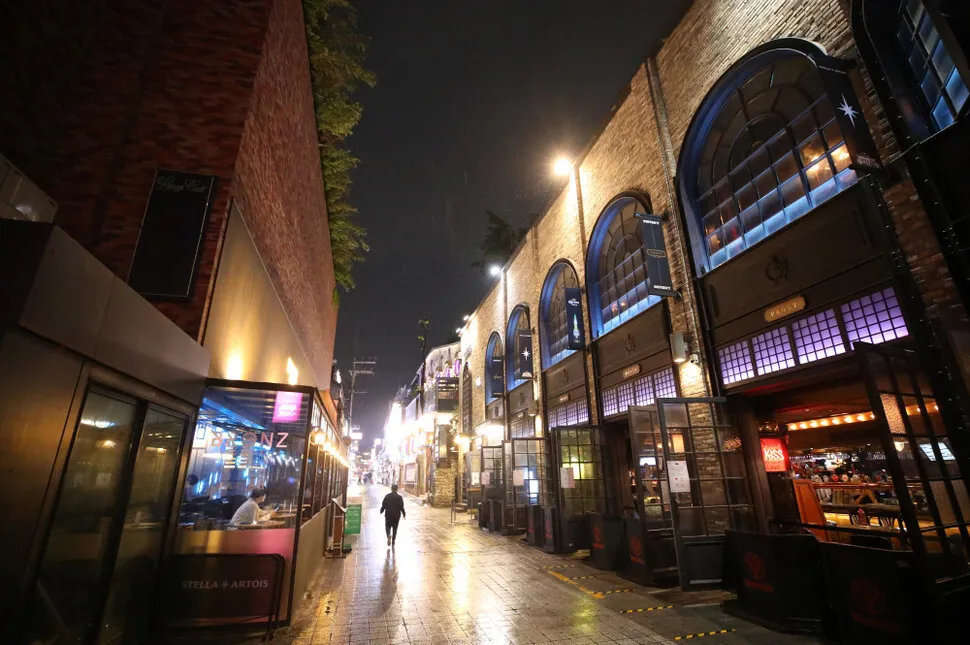hankyoreh
Links to other country sites 다른 나라 사이트 링크
Media reports surrounding Itaewon club outbreak accused of homophobia

As a cluster of novel coronavirus infections originating from clubs in the Itaewon neighborhood in Seoul’s Yongsan District has been spreading in the Seoul Capital Area (SCA) and elsewhere, some news outlets have been drawing ire with irrelevant reforms attacking the human rights of LGBT people. Experts and the administration lambasted the attitude as disruptive to disease control efforts.
On May 7, the Kukmin Ilbo newspaper reported that a resident of Yongin, Gyeonggi Province, who tested positive for the virus had visited a club in the Itaewon area. The piece was published under the title “Confirmed coronavirus patient visits gay club.” After the piece went out -- with information included about the patient’s place of resident and workplace -- additional articles began mentioning “gay clubs,” and pieces were published online speculating about the patient’s sexual orientation.
In addition, the Kukmin Ilbo also published a report on May 9 about a confirmed coronavirus patient visiting a sauna located in Seoul’s Gangnam District. In the piece, it described the sauna as “one of the leading saunas visited by male homosexuals to engage in sexual acts with anonymous males,” adding that “social distancing is effectively impossible in the darkened rooms because the main purpose is sexual intercourse.”
Observers responded by noting that the “gay” associations of the locations visited by coronavirus patients are irrelevant in terms of disease prevention, and that reports emphasizing this aspect could actually impede the disease control effort by placing all responsibility on LGBT people -- as the human rights infringement associated with involuntary outing and concerns about homophobia could cause people to be fearful of getting tested.
“Sexual orientation is irrelevant [to this situation], yet it keeps being played up. I don’t think it is good for things to be moving in a direction of scapegoating particular groups of people, intentionally or unintentionally,” said Kim Woo-joo, a professor of infectious diseases at Korea University Guro Hospital.
“We can criticize actions such as not wearing face masks, but it doesn’t help the disease control effort to scapegoat a particular group,” he stressed.
Prime Minister Chung Sye-kyun shared a similar message while presiding over a meeting of the Central Disaster and Safety Countermeasures Headquarters (CDSCHQ) that afternoon.
“From a disease control perspective, denunciation of a particular community is not helpful,” he said.
“If people who were in contact [with a coronavirus patient] shun testing because they’re afraid of condemnation, the damage from that is something our society faces collectively,” he stressed.
In a statement released on May 7, Solidarity for LGBT Human Rights of Korea said, “The attitude of media that have been disclosing the sexual orientation of coronavirus patients and focusing their energies on digging up information unrelated to the disease only adds an element of homophobia to the stigma surrounding the disease.”
“This will merely lead to the disease falling into the shadows, and it will not help at all with disease prevention or control,” it stressed.
By Song Gyung-hwa and uh Hye-mi
Please direct comments or questions to [english@hani.co.kr]

Editorial・opinion
![[Column] Imperial tyranny, Korean humiliation [Column] Imperial tyranny, Korean humiliation](https://flexible.img.hani.co.kr/flexible/normal/500/300/imgdb/original/2025/0912/7617576652278449.jpg) [Column] Imperial tyranny, Korean humiliation
[Column] Imperial tyranny, Korean humiliation![[Correspondent’s column] Cognitive dissonance in MAGA world [Correspondent’s column] Cognitive dissonance in MAGA world](https://flexible.img.hani.co.kr/flexible/normal/500/300/imgdb/original/2025/0912/3417576648512186.jpg) [Correspondent’s column] Cognitive dissonance in MAGA world
[Correspondent’s column] Cognitive dissonance in MAGA world- [Editorial] Korea, US need a ‘gentlemen’s agreement’ on what job creation entails
- [Column] Why MAGA has its eyes set on Korea
- [Column] Lee still has his work cut out for him after summit with Trump
- [Editorial] Is this any way for the US to treat an ally?
- [Column] Lee’s difficult task of striking a balance on Japan
- [Editorial] Multipolar era means Seoul must broaden its diplomacy
- [Column] North and South Korea are no longer pawns in US-China-Russia relations
- [Column] Who we fail when we oversimplify the ‘comfort women’ issue
Most viewed articles
- 1Seoul says US must fix its visa system if it wants Korea’s investments
- 2North Korea said to have exposed numerous US spies after botched 2019 SEAL mission
- 3[Column] Imperial tyranny, Korean humiliation
- 4Freed workers arrive in Korea, one week after ICE raid in Georgia
- 5Korea’s president says firms will be ‘very hesitant’ about investing in US after ICE raid
- 6[Correspondent’s column] Cognitive dissonance in MAGA world
- 7Son of ex-President Roh Tae-woo tapped to serve as ambassador to China
- 8MAGA’s traveling circus comes to Korea
- 9[Column] Why MAGA has its eyes set on Korea
- 10Lee says he won’t sign any tariff deal with US that doesn’t benefit Korea